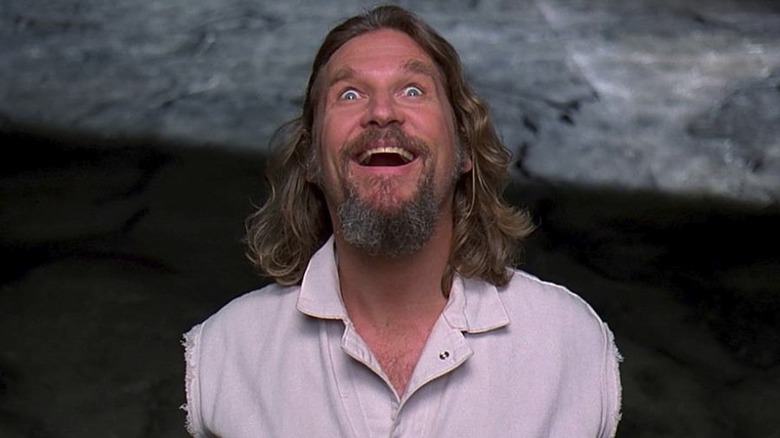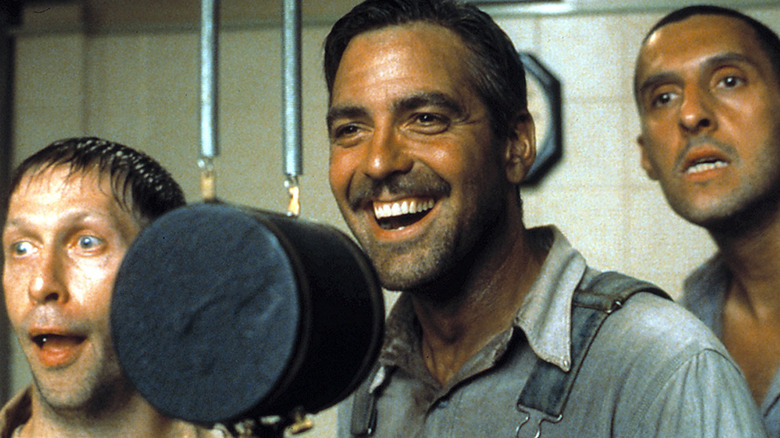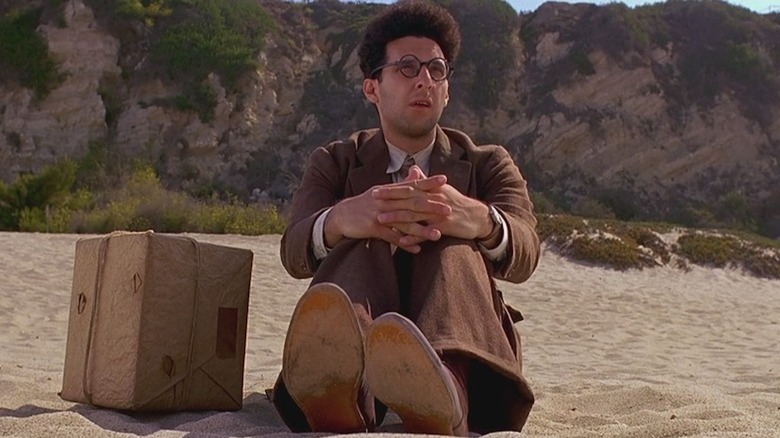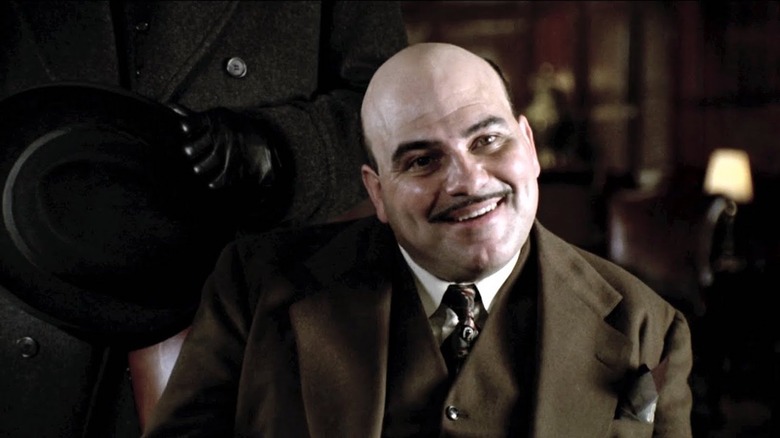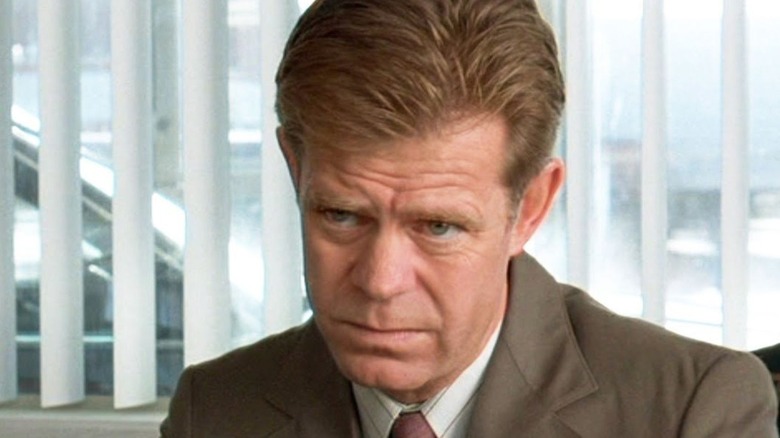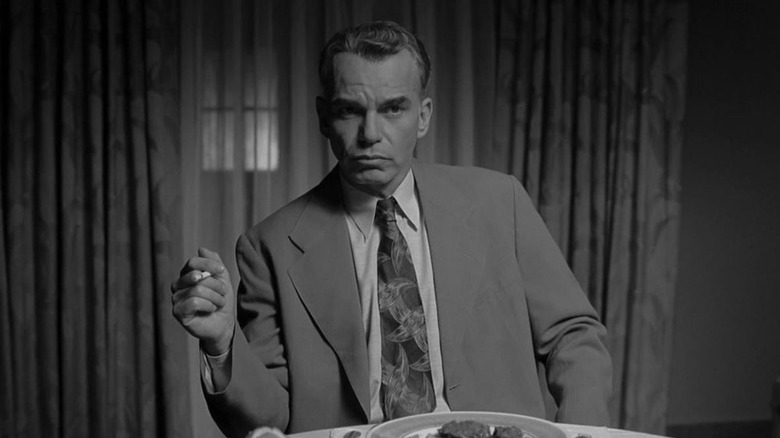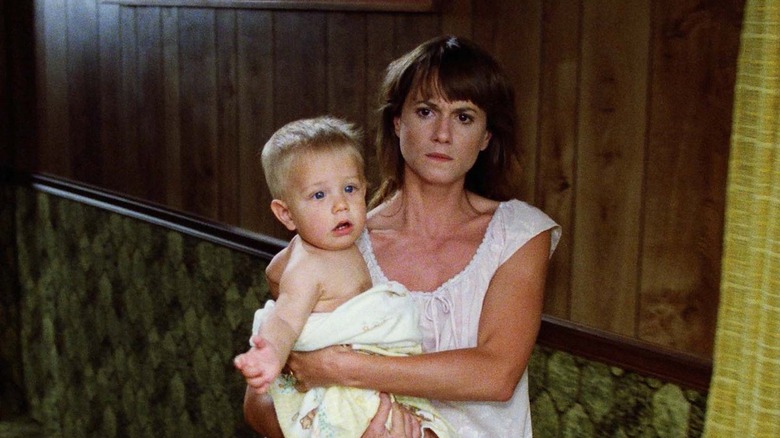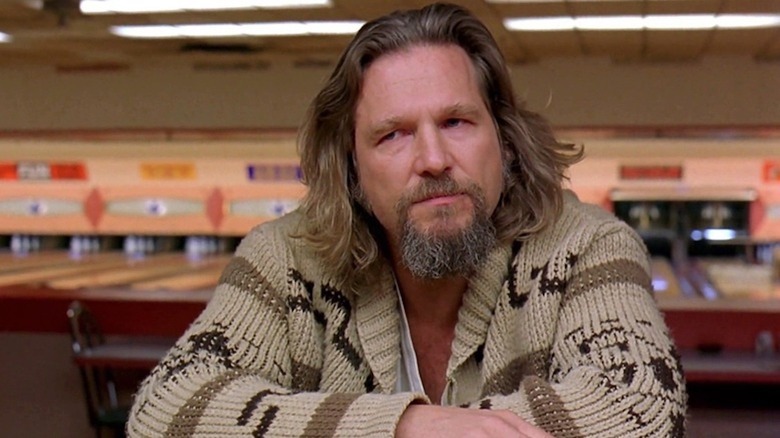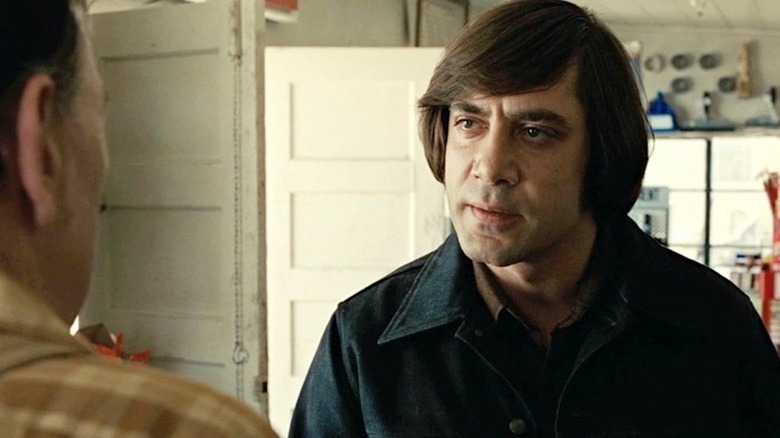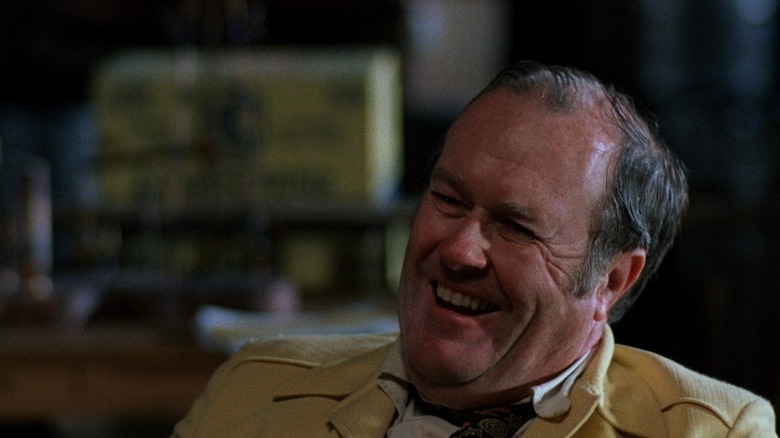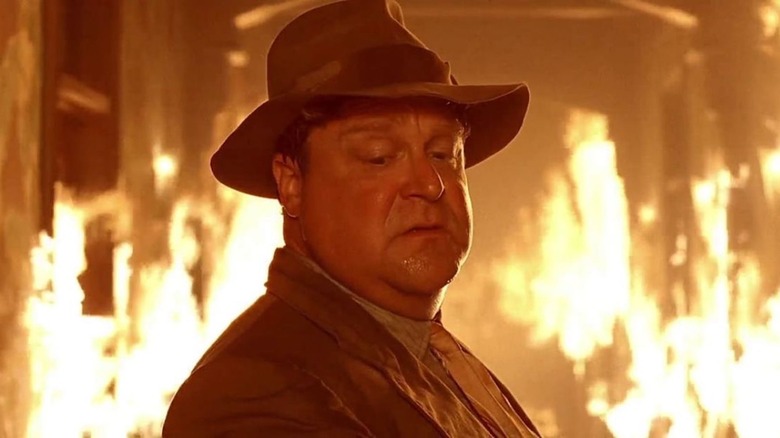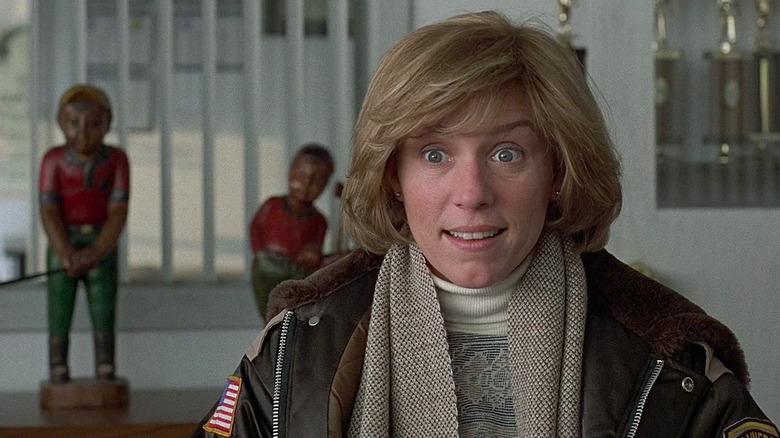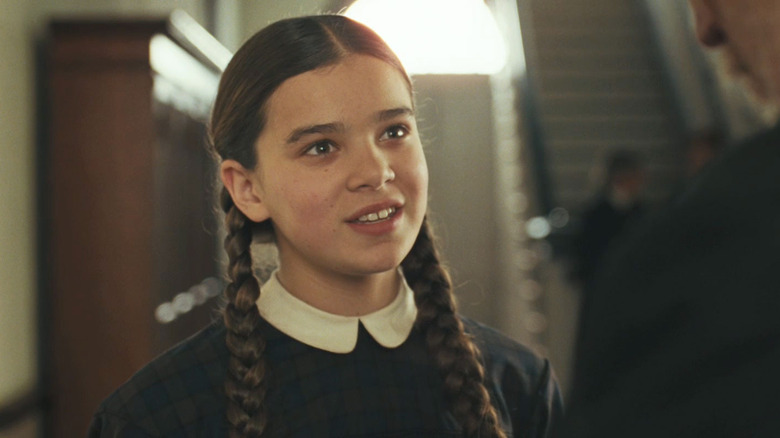12 Best Performances In Coen Brothers Movies
Joel and Ethan Coen began their filmmaking odyssey in 1984 with "Blood Simple," a caustically comedic neo-noir dredged out of the dark heart of Jim Thompson. Their showy directorial technique put them on the map, but their facility with actors — particularly character actor M. Emmett Walsh and the then-unknown Frances McDormand — drew the interest of savvy performers. Their dialogue was wittily concise, while their characters sidled a step or two from archetypes. There was gold here for a resourceful actor, and it didn't take long for those actors to find them.
Thirty-eight years later, the Coens have churned out multiple classics. What qualifies as "classic" depends on your taste, but if your taste is good, that list includes the aforementioned, "Raising Arizona," "Miller's Crossing," and, oh heck, pretty much everything not called "Intolerable Cruelty" or "The Ladykillers" — and those aren't bad movies! They just don't rise to the impeccable standard set by the Coens throughout their career.
The Coens' technical craftsmanship has been endlessly discussed, but how often do we go deep on the performances in their films? Probably not enough, since they've only directed two actors (McDormand for "Fargo" and Javier Bardem for "No Country for Old Men") to Oscar wins over the last four decades. When you focus on the actors, you're forced to pin down the elusive humanity of the Coens' work, which opens up a whole new avenue into their movies. When I started this list, I thought I had a clear favorite performance. Instead, I now have a brand new appreciation for a film I'd sidelined as a minor entry in their oeuvre. Let's dig in.
12. George Clooney as Ulysses Everett McGill in O Brother, Where Art Thou?
The handsomest man in the land's "numbskull trilogy" with the Coens (it's actually four movies) got off to a raucous start with his energetic portrayal of Ulysses Everett McGill, a kind-hearted Southern man given to sin, for which he's been remanded to a chain gang. This loose adaptation of Homer's "The Odyssey" documents Everett's escape, along with equally hapless compatriots Pete (John Turturro) and Delmar (Tim Blake Nelson), and it literally sings on account of Clooney's unabashedly cartoonish mugging and gesturing, under which lies the soul of a good man and a devoted husband.
Actually, the singing? That's bluegrass musician Dan Tyminsky, not Clooney. But the actor lip-syncs Tyminsky's tuneful hollerin' as the impromptu lead singer of The Soggy Bottom Boys with bug-eyed gusto. Despite his matinee-idol looks, Clooney didn't become a full-fledged movie star until he was almost forty, and, once he'd finally arrived, he did everything he could to tweak the caddish figure he'd cut on "ER." Everett is not the finest performance of that first rush of starring roles, and it's hard to call it fearless given the Coens' vaunted stature as filmmakers, but it was a much-needed antidote to the great big nothing of "The Perfect Storm." If Clooney wanted to be the next Paul Newman (and he did), he had to be a little reckless with his image. Everett gave him license to goof off, and it probably did more for his career than any film prior to "Syriana." He's such a brilliant, beautiful idiot. I dearly wanted to wedge "Burn After Reading" in here, but that's a smallish piece in an ensemble portrait of rank stupidity. Everett is Clooney's dimwit masterpiece.
11. John Turturro as Barton Fink
If this was a list of the most iconic performances in Coen brothers films, Turturro's beamed-from-Mars portrayal of Jesus Quintana in "The Big Lebowski" would be here, but his first two collaborations with the boys -– "The Shmatte Kid" Bernie Bernbaum in "Miller's Crossing," and the title character of "Barton Fink" -– are his high-water marks. And while it pains me to put Bernie down in the woods like a dumb animal, when I look into my Coens-loving heart, it burns with that Barton Fink feeling.
Based on real-life, socially conscious playwright Clifford Odets, who answered Hollywood's siren call in the 1930s to the lasting detriment of his career, Turturro's Fink is at once hopelessly overwhelmed and off-puttingly didactic. He's probably more of a worst-case stand-in for the Coens (who were struggling through the writing of "Miller's Crossing" when they knocked out this script) than a swipe at Odets for selling out; after all, if the brothers misfired on their next two films for 20th Century Fox, they might've been forced to make the '90s equivalent of a Wallace Beery wrestling picture. Turturro taps directly into that toxic mixture of conceitedness and terror. After getting steamrolled by studio boss Jack Lipnick (Michael Lerner), he returns to his hotel and condescends to his plain-spoken neighbor Charlie Meadows (John Goodman). Fink's a microbe drifting about the ocean of Hollywood, and, deep down, he can't cope with the castrating scale of his compromise. Turturro deftly takes us from the writer's vainglorious heights to his hollowed-out nadir. On that beach, we finally see Fink not as a theatrical powerhouse or an ill-fitting Hollywood cog, but as a failure of a man.
10. Jon Polito as Johnny Caspar in Miller's Crossing
Jon Polito might be the most unsung member of the Coens' company of actors. Given his stout, sweaty comportment and a strained vocality that made it sound like he was constantly trying to dislodge a whole ham bone from his throat, Polito, who passed away far too soon in 2016, served specific purposes. It's difficult to choose his finest collaboration with the Coens. Of the five films they made together, I have the softest of spots for his anxious portrayal of dry-cleaning schemer Creighton Tolliver (particularly his delivery of "Writ large in legal escriture"). But there is just no denying the prickly majesty of aggrieved crime boss Johnny Caspar in "Miller's Crossing."
Polito kicks off the twisty, Hammett-esque gangster flick with a short monologue on "ethics," which, in Caspar's world, means reaping a guaranteed windfall on a crooked fight. "If you can't trust a fix, what can you trust?" This skewed sense of morality is the perfect introduction to the looking-glass logic of the criminal lifestyle. I considered slotting Gabriel Byrne, Albert Finney, John Turturro, or Marcia Gay Harden in here, but when I think of "Miller's Crossing," I go straight to Polito's opening speech. As the film wears on, we don't respect Caspar a great deal. He's constantly griping about getting the high hat, and does himself in by foolishly executing his feared right-hand goon, The Dane (J.E. Freeman). But playing the fool in a Coen brothers film is a rare pleasure, and no one played this part with greater relish than Polito.
9. William H. Macy as Jerry Lundegaard in Fargo
William H. Macy exploded from the ranks of "that guy" character actors with this master class in woe. Jerry Lundegaard is a meek fool who toils spitefully at a Minneapolis car dealership owned by his father-in-law, Wade Gustafson (Harve Presnell). To remedy his financial woes, he concocts a blackmail scheme that requires two hugely untrustworthy scumbags (Steve Buscemi and Peter Stomare) to kidnap his wife. Everything, of course, goes disastrously wrong for Jerry, and he soon finds himself crumbling under the perky grilling of Brainerd police officer Marge Gunderson (Frances McDormand).
Macy pulls off an olympic feat of empathy in allowing us to understand how a petty tyrant like Wade could drive a doormat like Jerry to such loathsome extremes. His fidgety, eager-to-please energy gives us wincing insight into the plight of this cuckolded mediocrity. Jerry's entire life is based around serving his father-in-law. He has no independence. Whatever pride he possessed was browbeaten out of him long ago. To say Jerry's a shell of a man would be to suggest he's got an exterior capable of giving resistance. Take his two sessions at the dealership with Marge: He's a twitchy mess in their first encounter, and a transparently guilty clown during their second go-round. The way Macy's voice cracks on "I'm the executive sales manager" is the kind of vocal tic you can't plan. It's Macy's reward for a pathetic performance expertly done.
8. Billy Bob Thornton as Ed Crane in The Man Who Wasn't There
When Billy Bob Thornton popped in 1992 as co-writer and co-star of the masterful "One False Move," Hollywood didn't quite know what to make of the Arkansan. He wasn't a badass, nor was he a classically handsome leading man. This changed overnight with "Sling Blade," in which he disappeared into the role of a mentally disabled man who befriends an abused child. He was threatening there, too, but there was a remarkable stillness to his portrayal. By simply sitting and gazing off into the distance, as if deep in thought, Thornton invited us into the inner life of an inscrutable character.
The Coens both capitalized on and subverted this placidity with Ed Crane in "The Man Who Wasn't There." Thornton's Crane is a small-town simp who, on the surface, does nothing but cut hair, smoke cigarettes, and sit idly by as his alcoholic wife, Doris (Frances McDormand), carries on an affair with her boss, Big Dave Brewster (James Gandolfini). But there's more to Crane. The Coens give us access to Crane's thoughts (spoken serenely via voiceover by Thornton), and, contrary to what people think, he's got it all clocked. Yet when his blackmailing scheme results in the murder of Brewster, he has little interest in rising to his own defense. Thornton is rarely shot without a cigarette clenched in his fingers or dangling from his lips (on the film's commentary track, Thornton says he modeled Crane's smoking in part on talk show host Jack Paar). He's an enigma to everyone in his life, but not to us. He's a man resigned to mediocrity, and it's no skin off his nose if he goes to his grave looking like a horse's ass. This whole "living" thing was a puzzler anyway.
7. Holly Hunter as Edwina Ed McDonnough in Raising Arizona
"Hi ... I'm barren!" Holly Hunter's sensational 1987 got off to a rollicking start with her portrayal of police officer Edwina "Ed" McDonnough in the Coens' sophomore directing effort, "Raising Arizona." When Ed first meets recidivist Herbert I. (Hi) McDonnough (Nicolas Cage), she's a no-nonsense mugshot photographer. She betrays zero emotion as she barks at Hi to turn to his left and right. But this inveterate criminal is taken with her. When he gets run in on another offense and finds Ed distraught over her fiancé leaving her, Hi realizes there's a wounded romantic lurking under that officious facade. Hi wants to spend the rest of his life with her, and we want this, too.
This entails raising a family, and, as Hi learns over the course of the one of the most brilliantly orchestrated pre-credits sequence ever constructed, Ed's insides are "a rocky place where my seed could find no purchase." When Ed learns of the "Arizona quintuplets," she veers from ramrod-straight cop to willing lawbreaker, setting in motion one of the most audaciously original comedies of the 1980s. Hunter effortlessly manages Ed's wild emotional swings, giving purpose to Cage's loose-limbed clowning. She's been thrust into motherhood via illicit means, and, thus, is wholly unprepared for the rush of joy and terror that comes with parenthood. We know what to expect from the guileless Hi, but Ed is all surprises. Cage would be a gesticulating jackass without Hunter slinging curveballs at him in every scene.
6. Jeff Bridges as The Dude in The Big Lebowski
Jeff Bridges had a reputation as one of the most underrated actors of his generation when he shambled into the role that has come to define him both as an artist and as a human being –- and, thankfully, he seems to be perfectly okay with this. The bright-eyed son of "Sea Hunt" star Lloyd Bridges segued from buoyant, boyish performances in '70s classics like "The Last Picture Show" and "Thunderbolt and Lightfoot" to shapeshifting turns in films as varied as "Starman," "The Fabulous Baker Boys," and the criminally underseen "Fearless." He was a character actor in a movie star package.
Bridges didn't have a signature role until the Coens swaddled him in that comfy cashmere sweater and got him tangled up in a bogus kidnapping plot all because some goon peed on his favorite rug. Though The Dude is based in part on indie film producer Jeff Dowd, the character as written feels like a conflation of every major role Bridges had played up until that point. He's a mess of contradictions: a capable loser who's at his canniest when buzzed on pot and White Russians. The Dude isn't a man of action (unless bowling is involved), but he does rise to the lowest of occasions. As in the Coens' Washington D.C. masterpiece "Burn After Reading," there's never anything at stake in "The Big Lebowski." In this shaggy narrative, there's just The Dude. And as inhabited by Bridges, we would follow this aimlessly inspired man anywhere.
5. Javier Bardem as Anton Chigurh in No Country for Old Men
After a pair of mainstream studio disappointments ("Intolerable Cruelty" and "The Ladykillers"), the Coens got bleak with their adaptation of Cormac McCarthy's "No Country for Old Men." On one level, it's a neatly conceived neo-noir: There's an in-over-his-head protagonist (Josh Brolin) and a seen-it-all cop (Tommy Lee Jones) tracking him. But McCarthy spikes this rotgut concoction with a splash of grain alcohol in the form of Anton Chigurh. Chigurh is no ordinary hitman. He murders people with an unwieldy bolt pistol. He tortures an innocent filling station attendee with an ominous coin flip on which, unbeknownst to the attendee, his very existence depends. Chigurh is the Angel of Death. And, in the Coen-verse, Death couldn't look like more of a dork.
Javier Bardem was just about everyone's cup of tea when he took on the role of Chigurh in 2007. Having melted projectors fifteen years earlier opposite Penélope Cruz in Bigas Luna's "Jamón, Jamón," he seemed primed to exploit his outrageous sex appeal after finally hitting Hollywood's radar in Julian Schnabel's "Before Night Falls." Instead, he undermined his hunkiness by sporting a hideous pageboy haircut as the sheet-white, seemingly embalmed Chigurh. Bardem has said that working with the Coens was a dream come true, and his Chigurh is a nightmare for the ages. This isn't the kind of performance you single out for its subtle shadings. It's a portrait of pure evil. If it came down between Chigurh and "Blood Simple" character Loren Visser, the universe would collapse on itself.
4. M. Emmett Walsh as Loren Visser in Blood Simple
That laugh. What a horrible, honking laugh. M. Emmett Walsh was probably the biggest name in the Coen brothers' first movie. Born and raised in the Northeast, it's unclear where Walsh's drawl came from, or if it's even a drawl. Whatever its origin, that high-pitched delivery left its mark on the margins of "Slap Shot," "Straight Time," and "The Jerk," and blossomed into full-blown evil in "Blood Simple."
Walsh's Loren Visser is no run-of-the-mill sleazebag private detective. He might've been the Elks Club "Man of the Year" as his trusty cigarette lighter claims, but he behaves like an outright psychopath. Maybe that's an Elks thing. I don't know. I'm not an Elk. I do know that Walsh's Visser is a wicked piece of work who seems to have wandered in from an unfinished Jim Thompson novel. Whatever killing he didn't get to do there, he's more than happy to carry out here. And that's the most unsettling facet about Visser. When his client (Dan Hedaya) flings an envelope stuffed with the detective's payment, the weirdo doesn't bother to count the cash. He just creepily smokes his cigarette (Walsh goes from playfully blowing smoke rings to sloppy nasal exhales), and saunters out of the room, cackling all the way. Because he knows there's more killing to be done, and it'll be a pleasure to put more bodies in the ground. In this way, Visser is something of a dry run for Javier Bardem's Anton Chigurh. Killing is his business, and it doesn't matter if it pays well. He just enjoys the workout.
3. John Goodman as Charles Meadows/Karl Madman Mundt in Barton Fink
What was your introduction to John Goodman? Your answer will most assuredly color how you view his career as a character actor who occasionally functioned as a movie star. He first registered for me as the hardass Coach Harris in "Revenge of the Nerds." Though that highly problematic film is loaded with comedic distractions, Goodman commands his every scene. He's a scarily believable bastard who implores his meathead football players to forcefully evict freshmen from their dorm. Four years later, he was a teddy-bear dream of a TV dad as Dan Conner in "Roseanne." Goodman has effortlessly veered from vicious to lovable throughout his career. I'm not sure he's ever done it in one movie, but he gets awfully close as Charles Meadows/Karl "Madman" Mundt in "Barton Fink."
As Meadows, Goodman woos the know-it-all Fink with his hard-nosed, shoe-leather depiction of his life as a door-to-door insurance salesman. "I could tell you stories that'd curl your hair, but it looks like you've already heard 'em." He flatters Fink. He might even like him. Then, as Fink bemoans his situation as a for-hire writer, the switch gets flipped. "You're just a tourist with a typewriter, Barton. I live here." Fink is a thief. He appropriates experiences, and claims to understand the working man. But Goodman's Meadows is the one getting doors slammed in his face all day. When Meadows finally tires of Fink's condescension, Mundt appears, at which point Goodman unleashes a rage hot enough to reduce their hotel to ash. He shows us the life of the mind. That Goodman missed out on an Oscar nomination for this performance remains one of the Academy Awards' most baffling snubs.
2. Frances McDormand as Marge Gunderson in Fargo
"Blood Simple" didn't just launch the Coens' careers, it also gifted the world with the thespian force of nature that is Frances McDormand. Though her husband Joel and brother-in-law Ethan were viewed skeptically early in their career as film school brats specializing in empty technique, critics adored McDormand from jump. She earned her first Oscar nomination in 1989 (for "Mississippi Burning"), and seemed poised to become one of the most sought-after actors in the business. But aside from a splendid turn in Robert Altman's "Short Cuts," she spent the first half of the '90s appearing in non-starters like "The Butcher's Wife," "Passed Away," and "Beyond Rangoon." The parts were unworthy of her. Her family remedied this.
McDormand's Marge Gunderson in "Fargo" is the most delightfully quirky investigator this side of Peter Falk's Columbo. With her sunny demeanor, seven-months-pregnant bulge and excessive Minnesotan accent, she comes on as another classic Coen dope. But as Marge probes into the clumsily orchestrated kidnapping of Jean Lundegaard (Kristin Redrüd), we quickly realize that, even though she's rarely had to deal with a crime of this magnitude, she is a born detective who will amiably perform her tip-top police work until these murderous doofuses inevitably slip-up. McDormand has a ball with Marge, but beneath that indefatigably perky surface is a woman who is genuinely wounded by the depraved depths to which people will sink for "a little bit of money." It's a broad performance with fascinating nuances (e.g. her awkward dinner with ex-boyfriend Mike Yanagita) that grow richer and stranger with each viewing.
1. Hailee Steinfeld as Mattie Ross in True Grit
"Now here's what I have to say about that saddle." Hailee Steinfeld blew in out of nowhere to seize the reins of the Coen brothers' adaptation of Charles Portis' "True Grit." Jeff Bridges reuniting with his "Big Lebowski" cohorts to redefine a role played to Oscar-winning acclaim by John Wayne was supposed to be the main attraction, but when this 13-year-old unknown strides into a horse trader's office and doggedly bargains him into a corner, the movie is hers before Bridges even shows up.
The Coens' "True Grit" is a great film, and it doesn't feel like a Coens movie at all. It's as if the brothers read Charles Portis' novel, realized The Duke's version was listless hackwork directed by Henry Hathaway at the late, point-and-shoot portion of his career, and opted to do justice by a writer they admired. As good as Bridges, Matt Damon, and Josh Brolin are in the film (and Brolin is so very good), Steinfeld has a preternatural pluck that recalls Tatum O'Neal in "Paper Moon." There's nothing coached or overly rehearsed about Steinfeld's performance. She's the tip of the film's uncertain spear. We want for Mattie's vengeance, but, in obtaining it, she loses her arm and lives the rest of her life alone. There are very few performances that touch Steinfeld's work in "True Grit," and, in light of how quickly kids must grow up today if they're to seize the reins of their own future, it bums me out that we don't talk about it more often. Mattie is a hero, but she loses herself by seeking revenge. She's so capable. Her life needn't be defined by the failure of men. Steinfeld hits these notes with uncommon grace. It's exquisite work.
